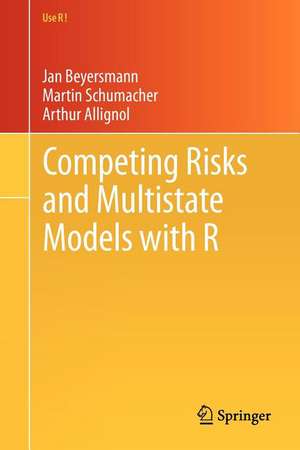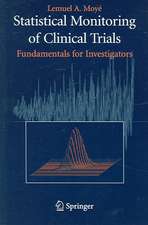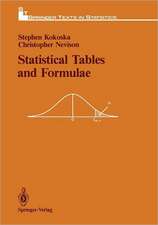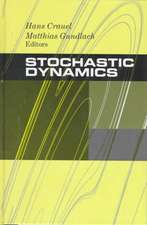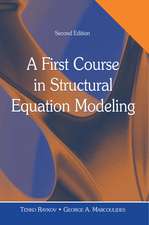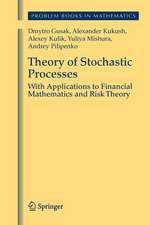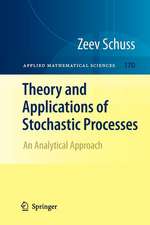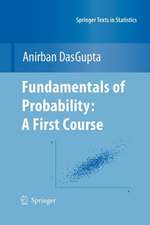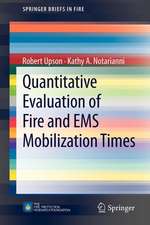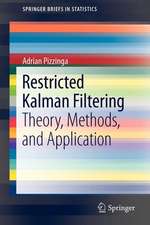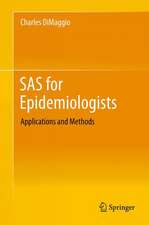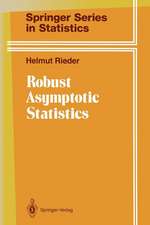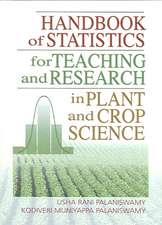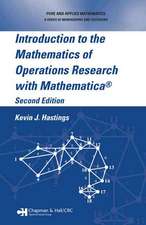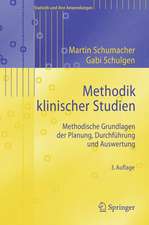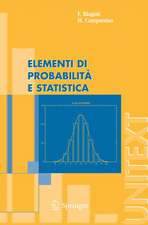Competing Risks and Multistate Models with R: Use R!
Autor Jan Beyersmann, Arthur Allignol, Martin Schumacheren Limba Engleză Paperback – 17 noi 2011
Din seria Use R!
- 15%
 Preț: 676.86 lei
Preț: 676.86 lei - 17%
 Preț: 362.74 lei
Preț: 362.74 lei - 15%
 Preț: 591.79 lei
Preț: 591.79 lei - 17%
 Preț: 362.15 lei
Preț: 362.15 lei - 17%
 Preț: 458.07 lei
Preț: 458.07 lei -
 Preț: 226.73 lei
Preț: 226.73 lei - 17%
 Preț: 395.94 lei
Preț: 395.94 lei -
 Preț: 374.86 lei
Preț: 374.86 lei - 20%
 Preț: 503.87 lei
Preț: 503.87 lei - 17%
 Preț: 396.92 lei
Preț: 396.92 lei - 15%
 Preț: 360.58 lei
Preț: 360.58 lei - 17%
 Preț: 430.21 lei
Preț: 430.21 lei -
 Preț: 276.09 lei
Preț: 276.09 lei - 15%
 Preț: 497.12 lei
Preț: 497.12 lei - 15%
 Preț: 471.53 lei
Preț: 471.53 lei - 15%
 Preț: 525.35 lei
Preț: 525.35 lei -
 Preț: 489.30 lei
Preț: 489.30 lei - 15%
 Preț: 494.85 lei
Preț: 494.85 lei -
 Preț: 455.89 lei
Preț: 455.89 lei - 15%
 Preț: 518.73 lei
Preț: 518.73 lei - 18%
 Preț: 786.18 lei
Preț: 786.18 lei - 15%
 Preț: 498.94 lei
Preț: 498.94 lei - 18%
 Preț: 783.35 lei
Preț: 783.35 lei - 18%
 Preț: 783.20 lei
Preț: 783.20 lei - 15%
 Preț: 497.42 lei
Preț: 497.42 lei -
 Preț: 451.26 lei
Preț: 451.26 lei -
 Preț: 420.40 lei
Preț: 420.40 lei - 15%
 Preț: 494.85 lei
Preț: 494.85 lei -
 Preț: 419.06 lei
Preț: 419.06 lei - 15%
 Preț: 695.70 lei
Preț: 695.70 lei - 15%
 Preț: 499.12 lei
Preț: 499.12 lei - 15%
 Preț: 493.89 lei
Preț: 493.89 lei - 15%
 Preț: 584.10 lei
Preț: 584.10 lei - 15%
 Preț: 591.47 lei
Preț: 591.47 lei - 15%
 Preț: 497.31 lei
Preț: 497.31 lei - 15%
 Preț: 696.02 lei
Preț: 696.02 lei -
 Preț: 420.02 lei
Preț: 420.02 lei -
 Preț: 489.87 lei
Preț: 489.87 lei - 15%
 Preț: 585.26 lei
Preț: 585.26 lei -
 Preț: 453.21 lei
Preț: 453.21 lei - 15%
 Preț: 507.95 lei
Preț: 507.95 lei -
 Preț: 388.34 lei
Preț: 388.34 lei - 15%
 Preț: 496.67 lei
Preț: 496.67 lei -
 Preț: 423.47 lei
Preț: 423.47 lei - 15%
 Preț: 520.61 lei
Preț: 520.61 lei - 15%
 Preț: 531.26 lei
Preț: 531.26 lei -
 Preț: 454.16 lei
Preț: 454.16 lei
Preț: 582.12 lei
Preț vechi: 684.84 lei
-15% Nou
Puncte Express: 873
Preț estimativ în valută:
111.42€ • 115.88$ • 93.37£
111.42€ • 115.88$ • 93.37£
Carte tipărită la comandă
Livrare economică 13-27 martie
Preluare comenzi: 021 569.72.76
Specificații
ISBN-13: 9781461420347
ISBN-10: 1461420342
Pagini: 260
Ilustrații: XI, 245 p. 49 illus.
Dimensiuni: 155 x 235 x 18 mm
Greutate: 0.37 kg
Ediția:2012
Editura: Springer
Colecția Springer
Seria Use R!
Locul publicării:New York, NY, United States
ISBN-10: 1461420342
Pagini: 260
Ilustrații: XI, 245 p. 49 illus.
Dimensiuni: 155 x 235 x 18 mm
Greutate: 0.37 kg
Ediția:2012
Editura: Springer
Colecția Springer
Seria Use R!
Locul publicării:New York, NY, United States
Public țintă
ResearchCuprins
Data examples.- An informal introduction to hazard-based analyses.- Competing risks.- Multistate modelling of competing risks.- Nonparametric estimation.- Proportional hazards models.- Nonparametric hypothesis testing.- Further topics in competing risks.- Multistate models and their connection to competing risks.- Nonparametric estimation.- Proportional transition hazards models.- Time-dependent covariates and multistate models.- Further topics in multistate modeling.
Notă biografică
The authors are affiliated with the Institute of Medical Biometry and Medical Informatics, University Medical Center Freiburg and the Freiburg Center for Data Analysis and Modelling, University of Freiburg, Germany. Jan Beyersmann is Senior Statistician and serves on the editorial board of Statistics in Medicine. Arthur Allignol is Statistician and has contributed several R packages on competing risks and multistate models. Martin Schumacher is Professor of Biostatistics and Director of the Institute of Medical Biometry and Medical Informatics, Freiburg. He has been involved in theoretical developments as well as in practical applications of survival analyses and their extensions over many years.
Textul de pe ultima copertă
Competing Risks and Multistate Models with R covers models that generalize the analysis of time to a single event (survival analysis) to analyzing the timing of distinct terminal events (competing risks) and possible intermediate events (multistate models). Both R and multistate methods are promoted with a focus on non- and semiparametric methods.
This book explains hazard-based analyses of competing risks and multistate data with R. Special emphasis is placed on the interpretation of the results. A unique feature of this book is that readers are encouraged to simulate their own data based on the transition hazards only, which are the key quantities of the subsequent analyses. This simulation-based approach is supplemented with real data examples from studies in clinical medicine where the authors have been involved.
This book is aimed at data analysts, with a background in standard survival analysis, who wish to understand, analyse and interpret more complex event histories with R. It is also suitable for graduate courses in biostatistics, statistics and epidemiological methods. The real data examples, R packages, and the entire R code used in the book are available online.
The authors are affiliated with the Institute of Medical Biometry and Medical Informatics, University Medical Center Freiburg and the Freiburg Center for Data Analysis and Modelling, University of Freiburg, Germany. Jan Beyersmann is Senior Statistician and serves on the editorial board of Statistics in Medicine. Arthur Allignol is Statistician and has contributed several R packages on competing risks and multistate models. Martin Schumacher is Professor of Biostatistics and Director of the Institute of Medical Biometry and Medical Informatics, Freiburg. He has been involved in theoretical developments as well as in practical applications of survival analyses and their extensions over many years.
This book explains hazard-based analyses of competing risks and multistate data with R. Special emphasis is placed on the interpretation of the results. A unique feature of this book is that readers are encouraged to simulate their own data based on the transition hazards only, which are the key quantities of the subsequent analyses. This simulation-based approach is supplemented with real data examples from studies in clinical medicine where the authors have been involved.
This book is aimed at data analysts, with a background in standard survival analysis, who wish to understand, analyse and interpret more complex event histories with R. It is also suitable for graduate courses in biostatistics, statistics and epidemiological methods. The real data examples, R packages, and the entire R code used in the book are available online.
The authors are affiliated with the Institute of Medical Biometry and Medical Informatics, University Medical Center Freiburg and the Freiburg Center for Data Analysis and Modelling, University of Freiburg, Germany. Jan Beyersmann is Senior Statistician and serves on the editorial board of Statistics in Medicine. Arthur Allignol is Statistician and has contributed several R packages on competing risks and multistate models. Martin Schumacher is Professor of Biostatistics and Director of the Institute of Medical Biometry and Medical Informatics, Freiburg. He has been involved in theoretical developments as well as in practical applications of survival analyses and their extensions over many years.
Caracteristici
This book enables the reader to analyse complex time-to-event data himself, using the free open source language R for statistical computing The data situations considered are competing risks--several, mutually exclusive event types and multistate models, that track an individuals history through different stages over time. These methods are a generalization of the now classical survivalanalysis--the analysis of time to one single event. Such data occur in a variety of fields, including life sciences, social sciences, economics and engineering The methods are explained on a non-technical level and instantly carried out in R. This book covers data structures, simulating data, analyses of real life data and plotting Includes supplementary material: sn.pub/extras
